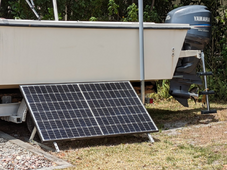yodamota
Solar Enthusiast
So I spent some time trying to find a thread on this. Just wondering how old some of y'alls Flooded lead acid batteries are? I realize use case will be different for each person but I figured just some figures would be handy for people.
Ours are currently 9 years old. 4 -6v Deka solar 370ah batteries. One of the batteries just bit the dust, any load on it drains it very quickly while the others are at 6.3vdc. We were given 4 - 6v rolls batteries by someone who said they were steaming and the water got to low on some of the cells while equalizing. They might be hooped but what the hell(free) They themselves are 10 years old.
I've heard people say they get 13 years from their FLA.
So I am curious to hear how old peoples batteries are.
Ours are currently 9 years old. 4 -6v Deka solar 370ah batteries. One of the batteries just bit the dust, any load on it drains it very quickly while the others are at 6.3vdc. We were given 4 - 6v rolls batteries by someone who said they were steaming and the water got to low on some of the cells while equalizing. They might be hooped but what the hell(free) They themselves are 10 years old.
I've heard people say they get 13 years from their FLA.
So I am curious to hear how old peoples batteries are.



